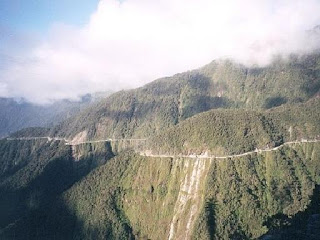The Amazing Information about Japan bridges & interchanges...
Japan a country full of technology...one can never imagine Japan of present after the calculation when japan was bombed back to stone age in the final years of the world war II. Now Japan has seen a drastic change in the infrastructure ........Lets have a look on the astonishing bridges & highways in japan....
Hakozaki Junction in Tokyo, Hokko Junction in Osaka...These both are the part of the Metropolitan Expressway. These images give the best example of the solution to be used in the crowded city like Japan..This also shows the technology engineers used when building multi-lane highway interchange....


Slipping Sideways
This image shows the damage of Hanshin Expressway during the 7.2 magnitude Great Hanshin Earthquake which hit the Kobe, Japan area in January of 1995, killing over 5,500 people and loss of over $200 billion.
Recession- Just a fake word for Japan....
Images below prove that japan still is in progress with the infrastructural development.

Continue reading....
Japan a country full of technology...one can never imagine Japan of present after the calculation when japan was bombed back to stone age in the final years of the world war II. Now Japan has seen a drastic change in the infrastructure ........Lets have a look on the astonishing bridges & highways in japan....
The Hokko Junction shown above - a part of the Hanshin Expressway near Japan's second city, Osaka is the best example of the curves in the bridges.
The curve technology is also reflected in Osaka is the Higashiosaka (East Osaka) Loop of the Hanshin Expressway.
This wide field view of the Higashiosaka interchange shows that engineers take the full advantage of he space.
Japan has Highways upon highways... without any end in sight:
Japanese elevated highways has one interesting feature that they often run above rivers or sea channels, using the available space above the water. Here are some of these "highways on the sea" -
The incredible Japanese road infrastructure really took off in the 1960s - check out the vintage photo on the right:

Such "Bladerunner" sights are commonplace now,

By the way, for the tricky "urban density" photography, head over to this page... and see if you can spot something wrong with the image there.
Slipping Sideways
This image shows the damage of Hanshin Expressway during the 7.2 magnitude Great Hanshin Earthquake which hit the Kobe, Japan area in January of 1995, killing over 5,500 people and loss of over $200 billion.
On the bright side, the affected sections of the highway did not "pancake", as happened in the 1989 Loma Prieta quake, but instead slipped sideways and tumbled over. Either way, one doesn't want to be driving through a highway interchange or junction when a big quake hits!
Recession- Just a fake word for Japan....
Images below prove that japan still is in progress with the infrastructural development.
Can anyone guess about what came first...building or the highway?The Hanshin Expressway takes a shortcut through the 5th to 7th floors of Fukushima's Gate Tower building, also known as the Bee Hive.
The story goes that the original building's owner wanted to knock it down and rebuild, but was told by city planners that the space was being allocated to a newly planned exit of the expressway. Both sides refused to budge, and the compromise was completed in 1992.
The Rainbow Bridge and the longest suspension bridge
Dark Roasted Blend has been covering some rather fascinating bridges before. Here are a few more - a spectacular sample from Japan. The 570 meter (1,870 ft) long Rainbow Bridge spans the northern (inner) part of Tokyo Bay and has been a city landmark since it opened in 1993. Two roadways, a transit line and pedestrian walkways all use the bridge, resulting in a seemingly chaotic tangle from certain angles.

Announced in 1969, the massive Kobe-Naruto highway route project stretches 81 kilometers to connect Japan's main island of Honshu with the much smaller island of Shikoku to the south. The jewel in the crown is the 4-kilometer long Akashi Kaikyo Bridge, which cost $3.6 billion to build over the ten year period between 1988 and 1998:
Of course, any discussion of Japanese highways wouldn't be complete without mention of Mount Fuji. The mountain's iconic snowy peak is visible from Tokyo - on clear days, at least - but though it's certainly possible to reach the dormant volcano's doorstep via highway, taking the Shinkansen bullet train is a better bet.







 \
\


















